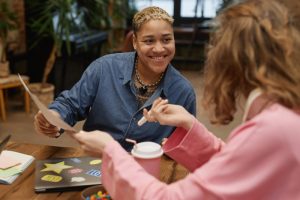I recently watched an inspirational and informative YouTube video on a TED talk by Sugata Mitra on the Self Organised Learning Environment (SOLE). Mitra explored the natural inquisitiveness of children and their thirst for knowledge using just a simple computer.
He found children sharing knowledge, exchanging ideas and teaching each other. The child became the teacher. The result of his research and observation is SOLE: collaboration on a global scale. He intends to build a school in the cloud where children can explore, collaborate and learn from each other.
As a former primary school teacher, I know that children in their nature are inquisitive. They learn by actively engaging. If you go into a primary school, children are already helping each other to learn. In group work, they collaborate together to solve a problem with each child looking at the problem from a different perspective. They see a problem differently and so each contributes a different idea. In peer-to-peer work, each child has a different strength and they learn from each other, sharing and exploring ideas. More and more, we see children setting the agenda for learning, assessing what they know and posing the questions to find out what they don’t.
This way of thinking in the classroom is illustrated in Mitra’s SOLE project, and in a new programme which is evolving in communities and institutions across the globe using digital technology and social constructivism: Education 3.0. Experiential learning set in a social context is one of the key characteristics of Education 3.0 – children are given space to design their own learning. Two pedagogical models are being created to take advantage of this natural inclination:
- Allowing learners work to co-design learning experiences in a collaborative environment
- Accommodating for learning experiences to take place through unstructured peer-to-peer learning
‘Social learning helps groups of people share their knowledge in non-hierarchical ways…’
Harold Jarche
According to Jarche, the automation of tasks within corporate environments will allow workers more thinking and innovation time. It doesn’t seem quite like that from my perspective, but there is merit in Education 3.0 for the corporate world.
Perhaps allowing learners in businesses to co-design development programmes would make those programmes better. It’s a sure-fire way to enhance social interaction, if every member of a group must contribute an idea. Collectively and individually, the 3.0 approach ensures learning is a personal investment, creating a sense of ownership that translates into an emotional engagement.
The aim should be to replicate within the corporate environment the wonderment we see in children’s faces as they explore a new environment or they close an electrical circuit.
Learning is not just about acquiring knowledge – it is about exploring, taking a step into the unknown and creating experiences where experiential learning can take place. I think we have much to learn from children in their refusal to stop questioning and wondering.
So with the advent of SOLE and Education 3.0, maybe it is time that corporate learning professionals started paying more attention to children. We may grow and change but the ability to create a new learning experience does not. It just gets harder to imagine.




